Evgeny Klimakin: This year you became the conductor of the I, CULTURE Orchestra, a youth orchestra that brings together musicians from Poland and the Eastern Partnership countries (Azerbaijan, Armenia, Belarus, Georgia, Moldova and Ukraine). Why do you want to work with young people?
Andrey Boreyko: With every year, it becomes more and more clear to me that professionals don’t always enjoy what they do. The work of a musician, even if in a very well-known musical group, is not always what they wanted. If a musician in an orchestra treats his service as an unpleasant necessity, then inspiring such people, trying to stimulate them into joint creativity, becomes much more difficult than with young people.
EK: Why are some professionals feeling unsatisfied with their work?
AB: Many of them were preparing for a solo career and consider themselves to be pretty well-off soloists. But at some point their solo career doesn’t work out. Family, children and loans force them to abandon hope of trying. Of course, I do see musicians who from the very beginning wanted to work in an orchestra, to be a part of a big organism. For example, there are many such people in the United Kingdom. But frankly, this is a rarity among experienced orchestral musicians. Young people on the other hand are always very eager to work, to develop and discover a new repertoire. They like to listen. They don't have the complexes of mature musicians.
EK: What do you mean?
AB: For example, situations when experienced musicians in large orchestras look at a conductor (especially a young one) in a somewhat patronising way: ‘What, who is he to me? I already know all this without him.’ Young novice musicians are always more willing to hear, listen, remember, trust. That's why I really love to work with young people.
Conservatories, especially in Eastern Europe, prepare soloists before anything else. Each teacher feels pride and great joy when their student wins a competition, they regard the successes of their students as their own. Nevertheless, one should also prepare musicians who are able to love not themselves in music, but music in themselves. People who will be interested not so much in winning international contests, flowers, fame and magazine covers, but in the very essence of a musical profession, who will be ready to work hard to later become a part of an orchestra. They may not possess the talent of David Oistrakh or Jascha Heifetz, but they have a love for music and in the future they will also have solid preparation and a profession. They may not start their career in the most famous team, but eventually, as they grow professionally, they may be admitted to the Berlin or New York Philharmonic. Only five to ten percent become soloists.
Youth orchestras are excellent material
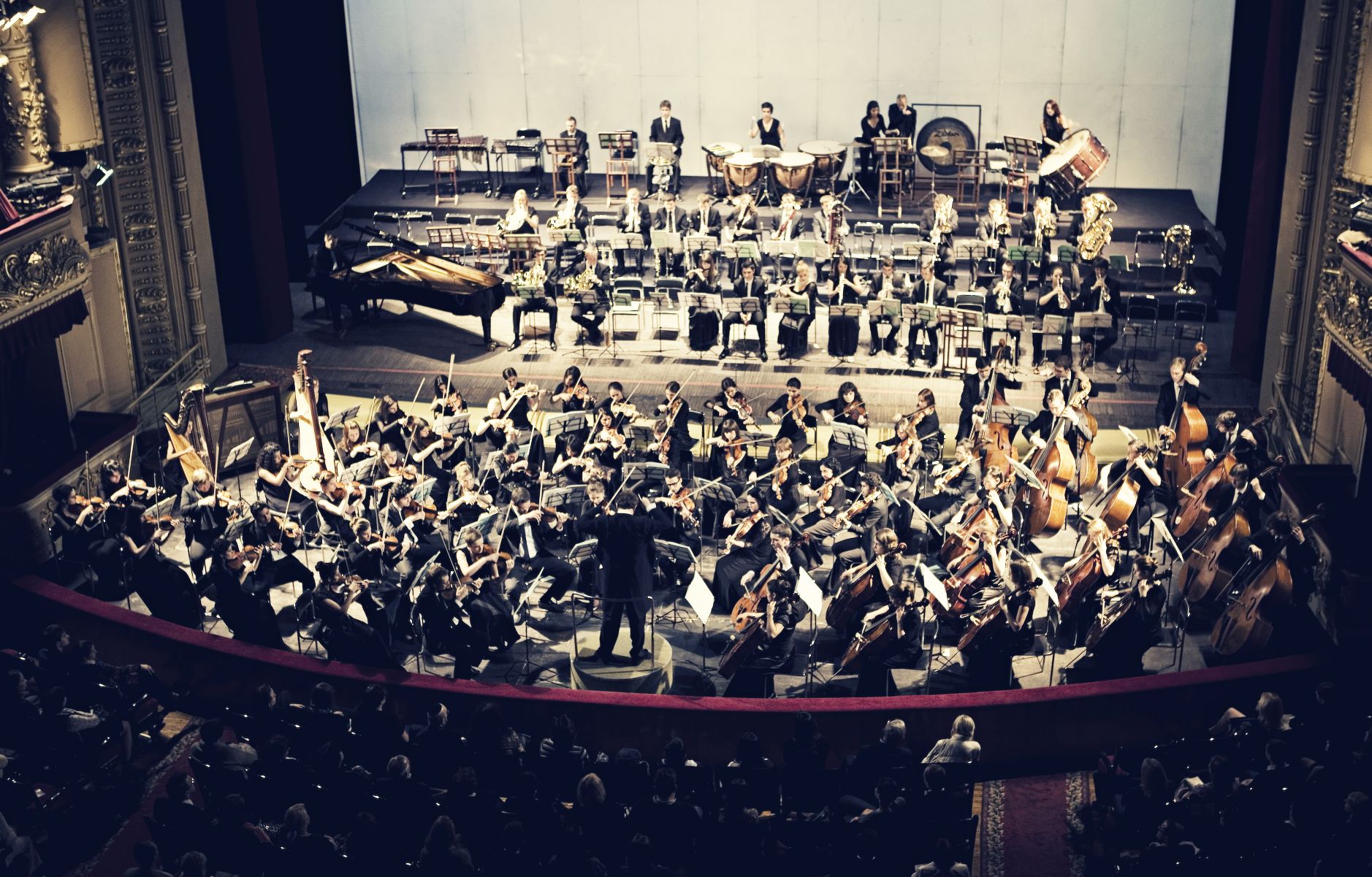 I, CULTURE Orchestra, Kyiv, photo: Elwira Nowicka
I, CULTURE Orchestra, Kyiv, photo: Elwira NowickaEK: Do you tell young people that not everyone should become a soloist?
AB: No. Everyone should make important decisions on his own, without any pressure from outside. Everyone has the right to dream. I cannot take that away. I don’t say: ‘You shouldn’t be soloists.’ I tell them that being an orchestral musician is equally interesting and wonderful. In some ways, this is even more difficult than what a soloist does. You see, when a soloist plays a concert of Tchaikovsky, Brahms or Sibelius, he or she assumes that the conductor and musicians of the orchestra are obliged to listen to him carefully, and so he can accelerate somewhere or slow down or add a rubato. ‘I am the soloist,’ he thinks.
When you play in an orchestra, on the contrary, especially in a string band, you have to be in perfect harmony both with your neighbours and with musicians from the other group. You have to listen to everyone! And also see the conductor and help the soloist. Believe me, this is not easy! By no means can everyone do it.
EK: You’ve worked with different youth orchestras...
AB: Yes. And their level was varied. Nevertheless, every youth orchestra is excellent material. Therefore I am glad to be working with I, CULTURE Orchestra. After all, an orchestra is like a Swiss clockwork: every detail must be of the highest quality. This is how the selection to our orchestra works: first there are auditions in different countries, when professionals from the best orchestras in the world choose the most worthy. Then the young people come to rehearsals and we start working together.
Young musicians are usually ready to rehearse indefinitely, they are engaged every day, they are in good shape. The only disadvantage is that they still don't know much. To give them necessary knowledge and skills is the task of the conductor and his assistants. I worked, for example, in the Jeunesse Musical World Orchestra, an international project in which teenagers, young people from 13 to 18 years old, very young musicians, take part.
Imagine a 13-year-old Filipino joining an international orchestra. At the beginning, they know more or less only those notes that they will have to play in a symphony. During rehearsals, they begin to understand what their role is in the orchestra and how important it is for the whole collective to play together and listen to others. Within a few weeks of working together, the young musician takes a path which for others may take several years. We want young people to understand the essence of their work and to be proud of the result.
Finding your way
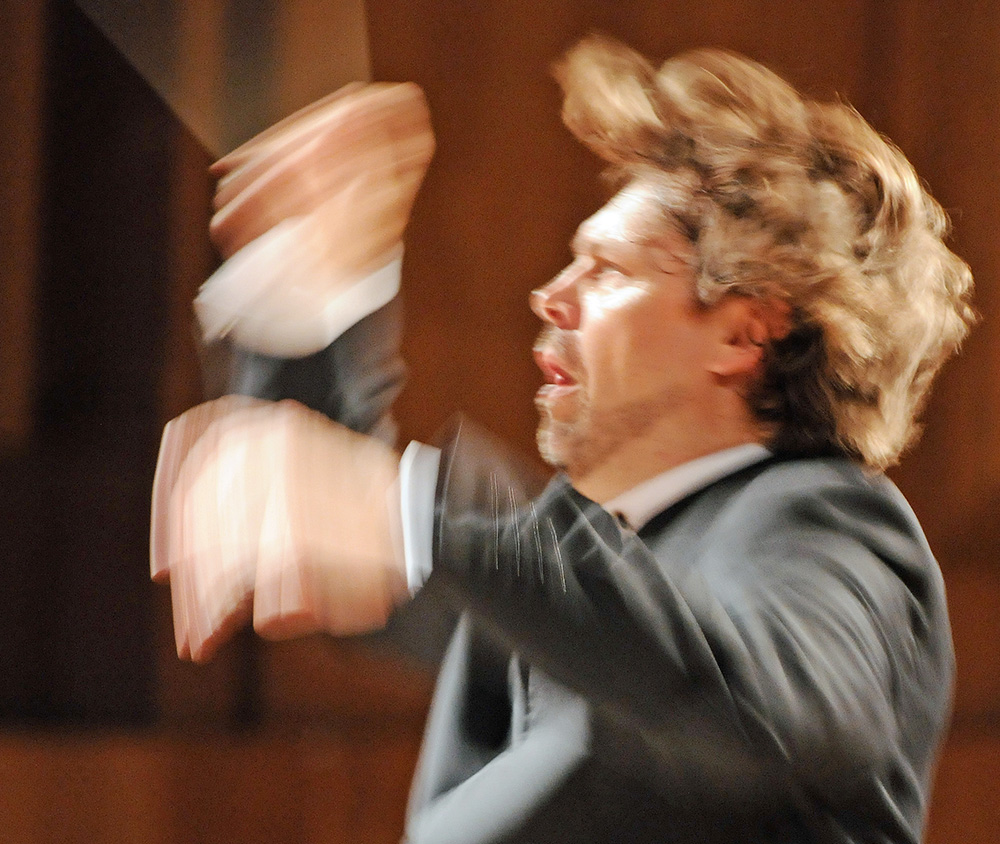 Аndrey Boreyko at the Witold Lutosławski Festival in 2008, photo: Eugeniusz Herbert/Forum
Аndrey Boreyko at the Witold Lutosławski Festival in 2008, photo: Eugeniusz Herbert/ForumEK: The I, CULTURE Orchestra admits musicians between 18 and 28. Did you at their age dream of a successful career as a conductor and of performing with the best orchestras in the world?
AB: No, I was very disoriented then… I played rock music, jazz. I was keen to play old instruments, write poetry, prose. I was attracted to a lot of different things, including conducting, but it wasn’t my only interest. If we talk about priorities, my focus on composition came about when I was studying at the Leningrad Conservatory [now the Saint Petersburg Conservatory]. However, quite suddenly, everything changed and went in a different direction.
EK: Why?
AB: I joined the class of a very respected teacher. Everything was fine, but after a year he fell seriously ill and died suddenly. I tried to go to the classes of other teachers on composition, but I felt them treating me like a stranger. At the same time, a close friend of mine invited me to a class on symphony conducting. I went there, liked it, and without dreaming of anything special, I decided to became a conductor.
EK: You didn’t regret giving up rock music?
AB: My passion for rock music lasted two years. I played keyboards there. All the band's musicians were graduates of the conservatory. The group was called The Model and we played progressive rock. We were big fans of Yes, Genesis, King Crimson. We got an award at a rock festival in Leningrad, but I didn’t imagine my future in this genre. I think that rock and its later varieties and branches are the music of the youth. I couldn’t imagine myself in the role of 70-year-old Mick Jagger, who still jumps on stage.
Then I became interested in jazz. I learned a lot from the wonderful, outstanding Leningrad jazzmen of the late 1980s. We even went to international festivals, but it didn’t last long either. Something new and inspiring for me was playing medieval instruments. In the Middle Ages, there were only two kinds of music: for God and for dances. There was nothing else. No one wrote symphonies about inner experiences or human suffering. Then it seemed to me that only old music is real. I learned to play old instruments, I founded the band Res Facta, then Barocco Consort. In today’s Russia there are innumerable groups, ensembles and orchestras that specialise in so-called authentic performance. But then, in the 1980s, we were one of only a handful.
The only thing I’ve never done is Russian folk. It was only after many years, when I became acquainted with the musicians of the Moscow Art Trio – Mikhail Alperin, Sergei Starostin, Arkady Shilkloper – that I began to understand the huge potential of this intonation space, the richness of its rhythm, and the freshness of its forms.
EK: Maybe it can still happen?
AB: Hard to say. It so happened that from birth I’ve been between two civilisations: the western and the eastern. My father was born in Poland, my mother in the USSR, so there are both these cultural layers in me. That is why neither Russian, nor Polish folk was for me something absolutely one hundred percent native. Yes, I can admire it. For example, I love the album of Grzegorz Ciechowski, the late lead singer of the band Republika, which is the result of mixing rock music with Polish folk, or the sensational adaptations of Polish Christmas carols performed by the Pospieszalski brothers and their orchestra. I am also very impressed by the work of the fantastic Russian singer Inna Zhelannaya and her musicians. Yes, I like it very much, but I want to do exactly what I do.
EK: In August, the young musicians who were admitted to the I, CULTURE Orchestra will meet in Poland. For some of them, this could be their first trip to the EU. Do you remember your first trip abroad?
AB: Of course! I will never forget my trip to Germany in 1989. The first wind of Perestroika had just somewhat refreshed the atmosphere in the USSR and I managed to get permission to travel to friends who lived in West Berlin.
Yes… How could I forget those first impressions? Even the air was different there! I entered another world that had never been shown in the USSR, of which we knew almost nothing and did not even guess! We had no Internet then. For two weeks, I walked along and looked at a completely different reality, different architecture, seeing smiling smartly-dressed people. I had almost no money, I had to economise and consider whether I could afford to drink coffee from one day to the next. But it was, of course, unforgettable.
The young people coming in August to Poland from the different countries of Eastern Europe will not be as surprised as I was in 1989. They know a lot now. Nevertheless, I think that they will be impressed by the wonderful Warsaw and Gdańsk cafes and shops, parks and concert halls, churches and palaces, and most importantly, the many beautiful, young, free people around. Visits to Kyiv, Minsk and Berlin will add new impressions, very different. Which musician hasn’t dreamt of being in those places where Gustav Mahler composed his great symphonies? Such impressions remain for life.
A man of two cultures
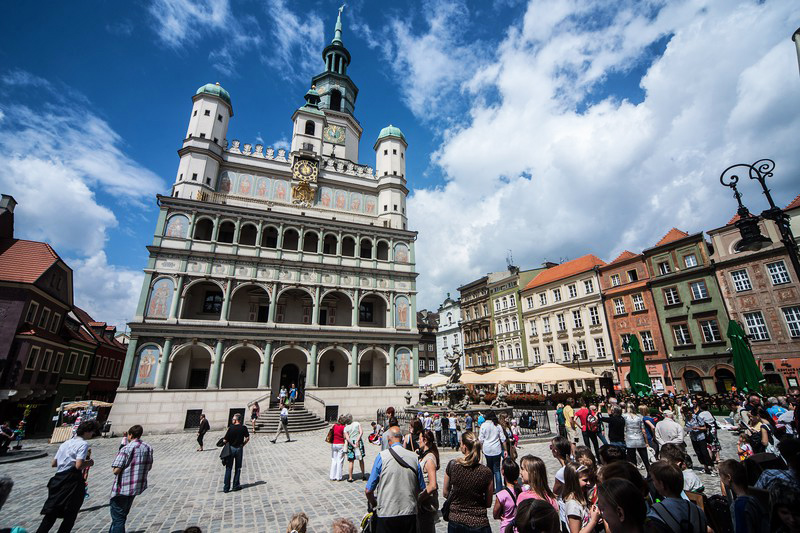 Poznań, Old Town, photo: Rafał Mieszka / East News
Poznań, Old Town, photo: Rafał Mieszka / East NewsEK: Your father was a Pole and your mother was Russian. How did they meet?
AB: Back then there was a tradition of sending the best Polish students to study in the USSR. So my father in the early 1950s came to Leningrad, and that was where he met my mother.
EK: You were born in Leningrad?
AB: My parents planned that this would happen in Poznań, but I hurried to come into the world and was born a month early in Leningrad. My half-brother on my father’s side studied our roots and found out that the Boreyko family was originally from Volhynia. Our ancestors eventually moved to Vilnius, where my father was born. When Soviet forces forcibly annexed Lithuania to the USSR, the family fled to the west of Poland and settled in Poznań.
EK: The first six years of your life you spent in Poznań?
AB: Yes. Here I learned to walk, speak, and my only language at the time was Polish. I was baptised here. This Polishness has always been an important part of my life. Later my parents, unfortunately, broke up.
I began to live with my mother in Leningrad, but very often went to my father. From him and his friends, I learned a lot of important things. For example, the fact that in 1940, on the orders of Stalin, the NKVD shot thousands of Polish officers in Katyń and elsewhere. Or that World War II began with the fact that Germany and the USSR attacked Poland in 1939, about the Warsaw Uprising, when the Red Army was standing on the other bank of the Vistula and waited, not even trying to help. I returned home and told my friends about it. During the protests by Solidarity, thanks to which Poland liberated itself from communism, I went to Leningrad with the badge of the legendary Polish trade union, and often visited the Catholic church. It was a form of protest, I guess.
EK: Were there any problems because of that?
AB: There were. I was summoned several times for a ‘serious conversation’ to the staff department of the conservatory. They said that I shouldn’t go around with the badge of the Solidarity, talk about the events in Poland, hinting at possible troubles... Later it turned out that the KGB were photographing the parishioners in the church I used to attend, and they reminded me of this too.
Because of my Polish origin, as well as taking the ‘wrong position’ in the USSR, I did not have the ‘right’ future. I must admit that this is an unenviable fate – to be between two fires and belong to these two peoples. Especially if you feel affection and gratitude to one blood and the other.
In Russia, I considered myself a Pole. My mother, grandmother, friends always called me ‘Andrzej’ (as on my Polish certificate of baptism), although ‘Andrey’ was written in Soviet documents. I’ve taught all my friends to correctly put the stress on the word ‘Pole’ on the last syllable, not on the first. For a girl, they knew that it was correct to say Polka, not Polyaczka. I brought the records of Penderecki, the then-popular bands Skaldowie and Breakout... In Leningrad, I felt like a Pole, a man who belongs to some special group. At that time, one joke I brought back from Poland was popular among my friends…
EK: What joke?
AB: What is Swedish-style group sex? It’s when there are ten Swedish couples, and they begin to do what they need to do. What is Polish-style group sex? This is when there are ten Polish couples and watch a film where ten Swedish couples are doing what they should do. What is Soviet-style group sex? This is when there are ten Soviet couples and listen to a friend from Poland who’s watching a film where ten Swedish couples are doing what they should do. So when I returned from my father to Leningrad, I told my friends about Poland using this joke.
Being Andrzej
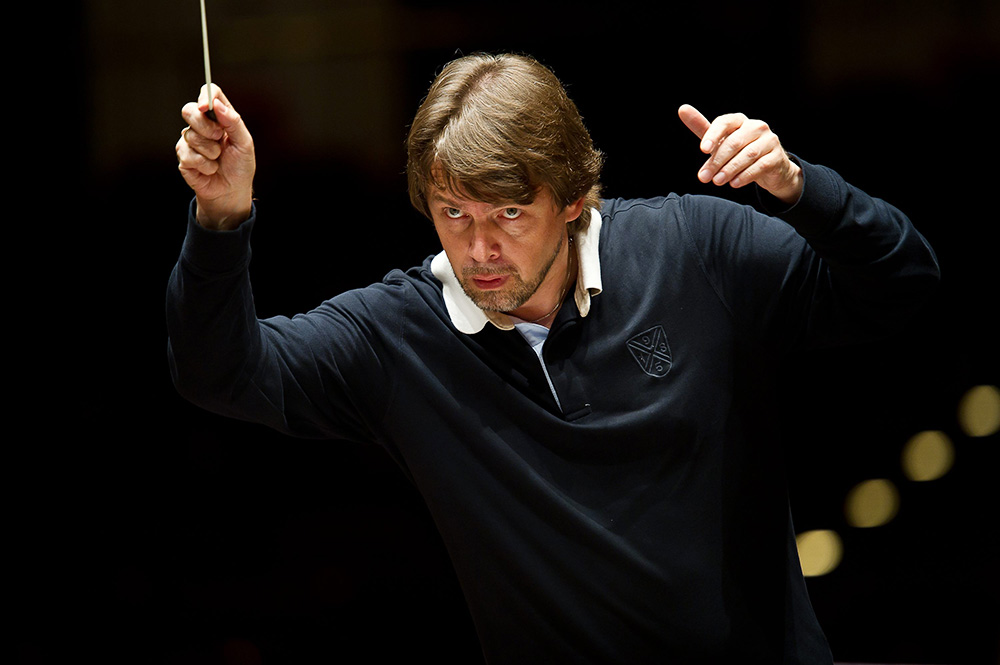 Аndrey Boreyko, photo: Clive Barda / ArenaPAL/Forum
Аndrey Boreyko, photo: Clive Barda / ArenaPAL/ForumEK: And how did you feel in Poland?
AB: I started to visit my father regularly when I was 12 years old. And, paradoxically, there I felt more like a Russian!
EK: Why?
AB: My relatives, for example, told me: ‘In the USSR you cannot move freely around the country, you need special permits.’ I, not knowing that just a few years earlier it had really been like this, was indignant and said that it wasn’t true.
I’ll never forget the shock that I experienced after my father told me the truth about the Warsaw Uprising. I was taught that we, the citizens of the USSR, having defended our country, went further to the west to liberate, to save Europe from the fascists. How could one stand and watch as those near-finished fascists suppressed the Warsaw Uprising, massively killing our allies? I couldn’t make sense of it!
EK: In 1991, you became the lead conductor of the Poznań Philharmonic Orchestra.
AB: Yes, I won the competition and moved there with my family. It seemed to me that I would be at home in Poznań – after all, I grew up there as a child. Disappointment came pretty quickly. It turned out that people did not perceive me as a Pole who had returned to his homeland, to the city where he took his first steps, but as a Russian. What is more, one appointed to the post by the cultural directorate, in which old cadres from the era of socialist Poland still worked. And this was now the year 1991!
It was difficult for me and it wasn’t an easy time either: Poland had only just freed itself from communism. Many people rejected everything that came from the east, everything connected with a joint non-voluntary union between the USSR and the Polish People’s Republic.
For example, I wanted the orchestra to play Dmitry Shostakovich’s Symphony No. 7, and the Art Council and trade union representatives told me that they categorically objected to me performing the propaganda works of Soviet composers that they had been forced to play for many years.
All my arguments about the greatness and authenticity of Shostakovich's music didn’t help. It only irritated them even more.
EK: You said that as a teenager you wanted to defend Russia in everything. Now that you’ve become one of the most popular conductors of our time, do you still do this?
AB: I want to protect and promote great Russian culture, art and music, but I will never be on the side of lies, injustice or the oppression of dissenters. Unfortunately, much in today's Russia is not close to me. Although I sincerely believe that Russia has colossal spiritual potential and a bright future awaits it, with every year it's more terrible and terrible for me to watch what’s happening. I do not share the views of those who shout, for example, ‘Crimea is ours’ or who call to fight in the Donbass. By annexing Crimea, Russia violated generally-accepted international norms, including official documents signed by Russia. This is unacceptable. By the way, because of what happened in 2014, I became estranged from some of my old friends. And not only me. The Crimean theme has divided many, it has caused strife even within families. I never thought that this would be possible...
EK: In August, you will perform together with the I, CULTURE Orchestra (ICO) in Kyiv.
AB: I’m very glad about this. I haven’t been there since 1983. We will have very little time, but I hope to get acquainted not only with the National Opera, where we will play, but also with the city – the fabulously beautiful Kyiv, the cradle of Slavic civilisation.
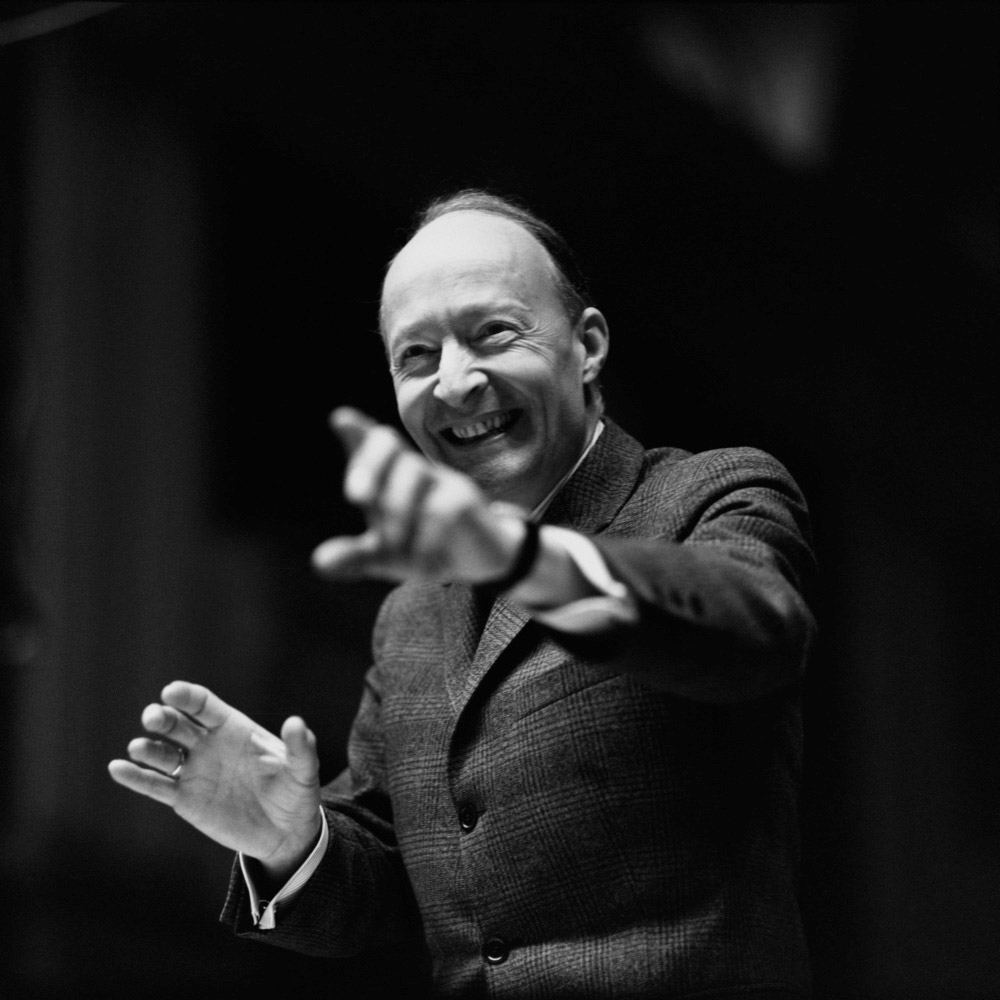 Witold Lutosławski, 1968, photo: Irena Jarosińska / Ośrodka KARTA collection
Witold Lutosławski, 1968, photo: Irena Jarosińska / Ośrodka KARTA collectionEK: Please tell us about the repertoire that you have chosen for the I, CULTURE Orchestra.
AB: This project was born in Warsaw, it is supported in every possible way by the Polish Ministry of Culture, so I consider it absolutely logical and natural that the programme includes Polish music. Of course, you could play the ever-young Chopin, but I chose Witold Lutosławski's Concerto for Orchestra, since this composition is a real compendium of knowledge and skills for young orchestral musicians. It's an amazing schooling, a work in which almost every musician can show himself.
This year marks the 80th birthday of the, no exaggeration, brilliant Ukrainian composer Valentyn Sylvestrov. I am deeply convinced that his music will live through the centuries. Sylvestrov is one of the most important composers of our time. I first came across his music in 1989. I organised a festival of his work in Sverdlovsk (now Yekaterinburg). I had the pleasure of performing his works in different countries of the world, as well as record several CDs. In the ICO programme, we will perform his surprisingly delicate, filigree work Herald. This is magical music that cannot help but touch the dialogue between two masters: Mozart and Silvestrov.
We will also play The Smile of Maud Lewis by Nikolai Korndorf, an interesting Russian composer who would have turned 70 in 2017, had he not died in Canada, where he lived his last years. This is a composition based on the technique of minimalism. It’s important that these young musicians are able to get acquainted with different techniques: we have classics (Beethoven's violin concerto), romance (the fantastic symphony by Berlioz), modernist concerto by Lutosławski, the minimalism of Korndorf, and constructivism from Valentin Sylvestrov's work. Thanks to this multi-layered programme, the young people in the orchestra will discover different styles of music. In addition, we are preparing a little surprise for the opening of the Chopin and His Europe festival. I wouldn’t like, however, to disclose all the cards...
EK: There are a lot of Polish composers in the programme of your performances. Do you feel like you’re a populariser of Polish culture?
AB: Certainly. On different stages of the world, I constantly try to remind audiences that Polish culture is not just Moniuszko, Chopin, Szymanowski, Lutosławski and Penderecki. I also try to represent the music of such Polish composers as Mieczyslaw Karłowicz, Aleksander Tansman, Michał Spisak, Grażyna Bacewicz... Or, for example, Andrzej Panufnik, who is quite famous in England, but in the rest of the music world hardly anyone knows him.
When I was in New York, I found the archive of Jerzy Fitelberg, the son of the famous Polish composer and conductor Grzegorz Fitelberg. It turned out that it contained manuscripts of the most interesting, unperformed and unrecorded works!
I very much hope that I’ll be able to do everything possible to make this amazing music be heard and understood.
Interview originally conducted in Russian, translated by ICO, June 2017